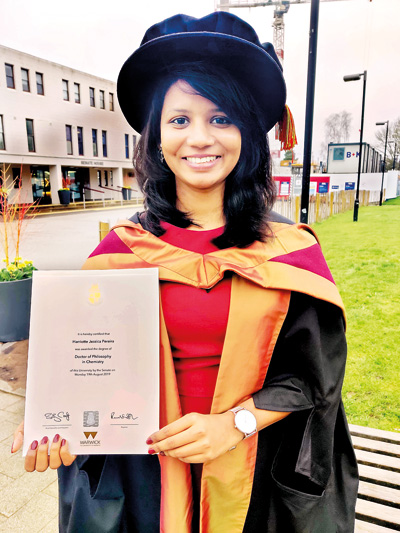Arts
Young Lankan scientist bags gold with copper research

Proud moment: Jessica after receiving her PhD and the artist within the scientist
Science and technology is a constantly growing subject. As new technologies emerge rapidly, the energy sector gets more competitive — making new ideas all the more important in the field.
As a scientist, Dr. Jessica Pereira tells us she has to constantly keep reading to familiarise herself with these new technologies and stay updated. Her studies led her to explore an innovative area that formed the basis of her PhD thesis titled ‘Nanostructured Copper Window & Reflective Electrodes for Organic Photovoltaics’ which was awarded the prestigious Royal Society of Chemistry (RSC) Energy Sector PhD Thesis Award in 2019 – making Jessica the first Sri Lankan and first student from the University of Warwick (UoW) to receive the award.
“This win is simply amazing and gives me enormous satisfaction as it brought to light the fruits of my hard work, carried out throughout 3.5 years!” Jessica says. “As RSC is an extremely distinguished organisation in the UK and well known and recognised worldwide, an award from RSC gives my research work a boost within the scientific community.”
Jessica has always been a high achiever in her academic career, having been the top student in her class since Grade 8. The youngest in a family of four, she studied at St. Lawrence’s Convent (SLC) up to O/L’s, and then moved to Holy Family Convent (HFC), Bambalapitiya for her A/Ls as she wanted to pursue the science stream.
Chemistry was always her favourite subject, as it had a good balance between fundamental science and application. “It included some mathematics/problem solving so it was not based on memorising subject material but rather on understanding the basics and applying them. I also loved the study of elements and chemical reactions and their applications” she explains.

She then graduated with a first class degree in Chemistry from the Institute of Chemistry Ceylon (IChemC) in 2014 – performing exceptionally well with over 20 prizes, first graduate chemist in her batch for each year and receiving the Shireen Jayasuriya Memorial Gold Medal in 2013 for overall best performance in all four years.
Beginning her career as a Teaching Assistant at IChemC she then worked as a Research Scientist at the Sri Lanka Institute of Nanotechnology (SLINTEC). At SLINTEC, she worked on a project with a leading local manufacturer to fabricate a coating to give rise to specialised surface properties. “It gave me an opportunity to put the theory I have learnt into practice and also gave me a feel of how advanced research would be,” she says.
This fuelled her interest in application oriented research, and inspired her to pursue a PhD. With the help of her mentors, she secured the Chancellor’s International Scholarship from UoW in 2015 – an honour reserved for only 25 students per year.
Here, her research began in the area of Organic Photovoltaics (OPVs) – organic electronic devices which can directly convert sunlight into electricity without any moving parts, which Jessica tells us is an excellent renewable and low-cost alternative to conventional electricity generation methods such as burning of fossil fuels.
For an OPV to function, it is dependent on a transparent electrode typically made of indium tin oxide (ITO) – a brittle material that is unsuitable for emerging flexible applications, further complicated by the scarcity of the element indium. As Jessica discovered through her research, copper is a much more sustainable choice for many reasons. Thus, she focused on developing nanostructured copper electrodes for OPVs for her PhD, which led to the fabrication of the most efficient copper based flexible OPV device to date with a power conversion efficiency of 8.7%.
“As Sri Lanka is a tropical island blessed with sunlight in abundance all throughout the year, I wondered if this technology would one day be the front runner in electricity generation in Sri Lanka,” she tells us. The need for renewable, sustainable technology is at an all-time high, as the overwhelming amounts of carbon dioxide emissions from fossil fuels contribute significantly to global warming. As Jessica points out, energy is an essential resource for the function of the modern world so any measure to reduce the carbon footprint will be massively beneficial.
Jessica’s goal is for her research to contribute clean and sustainable solutions for emerging technologies. She would also like to use her knowledge and experience to explore innovative approaches to energy harvesting and new product development.
Aside from her work, Jessica feels it’s important to have time to relax and enjoy. This keeps her energised and gives her a clear mind. She also loves arts and crafts and finds the time to sketch birds, animals or sceneries using ballpoint pens. “In my opinion I think if you plan and organise your work there will always be time for fun!” she explains.
She finds that passion should be the most important thing in anything you do. Research can be competitive and when things don’t go according to plan it can be quite demotivating. “So you need to be able to keep going until you see that silver line in the dark clouds,” she says.
Jessica is currently employed as a research fellow in organic materials for energy generation & storage at the University of Nottingham, United Kingdom. Here, she hopes to explore new research opportunities, broaden her skills and knowledge, and progress in her career to become an independent research leader in her field.
Many people have helped her throughout her life and Jessica feels lucky to have had “excellent teachers, inspiring mentors, loving Godparents and good friends who have supported her.”
She also adds that her PhD supervisor, Prof. Ross Hatton was a splendid mentor and provided her with all the guidance and support she needed. However, her father, mother and sister have and will always be her biggest blessing and source of strength.

